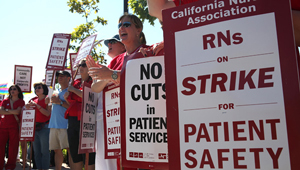On Monday, KQED's Mina Kim on Monday spoke with Dr. Joanne Spetz, a health care economist with UCSF, about this research. Here's an edited transcript of the interview:
You analyzed a report that asked the question, "do strikes kill?"
That's a paper that was released by the National Bureau of Economic Research; the two professors who worked on that are top-notch scholars. The quality of the research is excellent.
They found that there is a significantly higher risk of mortality in a hospital during a strike and that patients admitted during a strike were more likely to be admitted again later. Which is often a sign that the care during the initial hospitalization was inadequate.
Why might that be?
I talked to Professor Gruber about that not long ago. The paper concluded that issues arise that might compromise some of the standards of safety due to the uncertainty of having traveling or temp nurses filling in.
Not that traveling nurses cannot provide excellent care; any of those nurses who fill in during strikes are top-notch clinicians. But they're working in an unfamiliar setting, they often have never been in that hospital before, they don't know which doctors to ask about what. They don’t' necessarily know where every single supply is kept. They might not understand the computerized medical record system well, or it might be one they've never worked with before.
There are a lot of things that are very different across every single hospital, and even across the units within the hospital that effect how a nurse is able to perform his or her job. So when you have temporary staff filling in during a strike, of course there's more uncertainty for them in the work that they're doing. I think the evidence of this paper is that very well may increase the level of risk faced by patients.
The nurses union is pointing at the hospital as responsible for the death. In situations where a death occurs and it is linked to a strike and the factors that the report points to, who's responsible?
In the end, from a legal perspective, the hospital as well as the particular nurse in question will probably be held responsible. But from a broader perspective, there's plenty of blame to lay. For a union to engage in a strike, they must essentially be saying that the patient risk that's higher during that strike is worth it for some gains they believe they will receive in the future.
Now maybe in this case the union believes the working conditions are unsafe enough for patients that it's worth taking that risk over a one-day strike in order to protect more patients in the long-term.
Another possibility is that during a strike, the patients who are in the hospital are the most severely ill, who absolutely have to be there. Usually, all of the elective surgeries and all the things that can be postponed are typically delayed until after the strike.
So you have a patient population at higher risk simply because they're sicker. You put the two together and you end up with Dr Gruber's finding of a higher mortality rate and a higher re-admission rate.
What would you like people to take away from this incident?
Adverse events like this occur more frequently at hospitals than anyone wants. The fact that it occurred during a strike and therefore has become a public relations issue for both sides draws attention to underlying problems with respect to quality of care with the difficulty of consistently administering medication safely day after day.
Hospital care is a difficult business and it entails a certain amount of risk. For patients, certainly you want to be more cautious about going into a hospital if you don't need to, if there is a labor issue or a strike that's pending. But there should be broader attention to patient safety issues in general across all hospitals, not just these hospitals affected by the strike.
